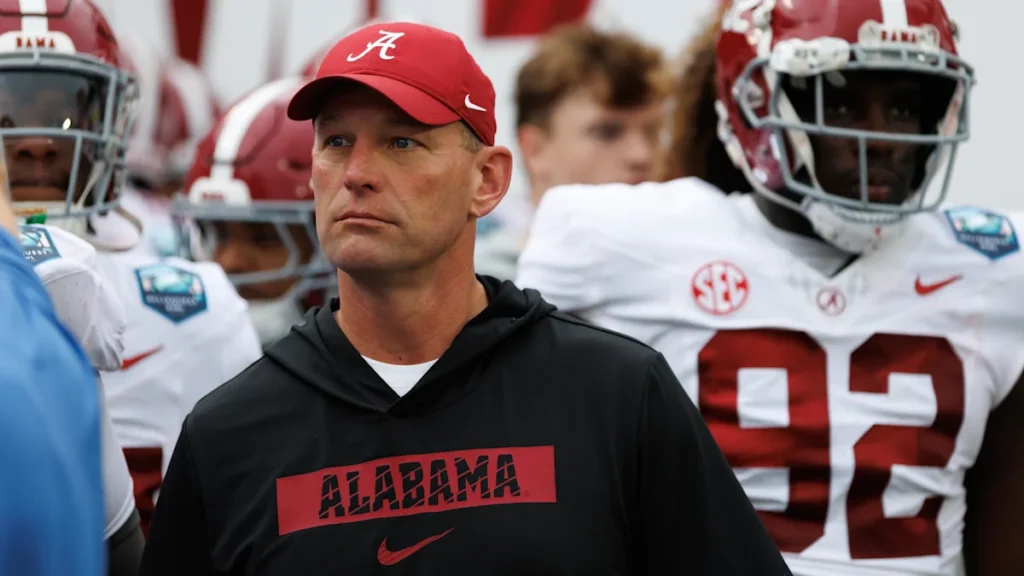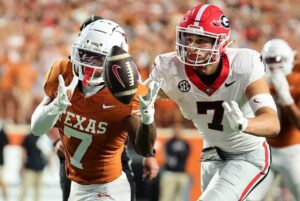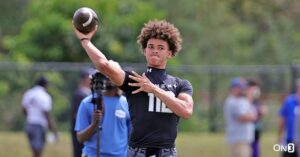
Alabama Football’s Kalen DeBoer on Spring Transfer Portal: ‘The Grass Isn’t Always Greener
As the college football landscape continues to shift under the weight of the transfer portal and NIL dynamics, Alabama football finds itself at a pivotal moment under first-year head coach Kalen DeBoer. With the spring transfer window officially open, speculation looms over who might be departing or arriving in Tuscaloosa. But DeBoer isn’t mincing words. His message to players—both in-house and those watching from afar—is clear and intentional: “The grass isn’t always greener.”
In a candid post-scrimmage media session following Alabama’s second spring scrimmage, DeBoer addressed the increasingly turbulent nature of the spring portal. With a program historically defined by structure, loyalty, and player development, Alabama now faces the modern realities of athletes seeking immediate playing time and brand opportunities elsewhere.
Yet, DeBoer’s approach blends realism with reassurance. As he builds his version of Alabama football in the post-Nick Saban era, he’s signaling that commitment to the process, not impulsive decisions, will separate future champions from cautionary tales.
A Portal Era Like No Other
The NCAA transfer portal has fundamentally altered how college football rosters are constructed. Players now have two open windows annually—one in the winter following the season and one in the spring after spring practice. The latter has become a particularly tricky window for coaches, as athletes dissatisfied with their standing on the depth chart after spring ball often bolt for greener—or presumed greener—pastures.
DeBoer, now tasked with leading one of college football’s most tradition-rich programs, is no stranger to roster turnover. During his time at Washington, he deftly used the portal to acquire top-tier talent, most notably quarterback Michael Penix Jr. But at Alabama, where the stakes are higher and the expectations heavier, he’s urging a more patient mindset.
“I understand guys want to play. That’s what competitors do,” DeBoer said. “But you also have to be smart about how and why you make those decisions. Sometimes staying in the fight and continuing to grow pays off in ways you don’t see right away.”
The Depth Chart Dilemma
One of the most common triggers for spring transfers is dissatisfaction with the depth chart. By mid-April, players typically have a clearer picture of where they stand, and those not projected to start often begin looking elsewhere. At a place like Alabama, where four- and five-star talent crowds nearly every position room, the temptation to leave can be especially strong.
“There’s a logjam in certain spots,” DeBoer admitted. “But iron sharpens iron. That competition is what has made Alabama great, and it’s going to continue to make us great.”
Several players—particularly younger ones—have taken major strides this spring. Redshirt freshmen and sophomores are pushing upperclassmen for playing time. While that’s healthy in terms of program growth, it also creates anxiety among those who feel overlooked.
DeBoer has met individually with players and reiterated the importance of patience and perseverance. “Development is a long game,” he said. “You don’t win championships with guys who gave up when it got tough.”
Retention Strategy: Culture Over Panic
With portal entries expected to spike nationally, DeBoer and his staff are focused on what they can control—retention. That begins with culture.
“We’ve put a lot of effort into building relationships,” said DeBoer. “These guys need to know we believe in them. They need to feel that they’re part of something bigger.”
Alabama has implemented a structured system of position coaches, team leaders, and off-field staff working to maintain open communication with players. Mental health resources and NIL education have also been part of the effort to ensure players are supported beyond the football field.
“When players feel heard, they’re less likely to leave in frustration,” said defensive coordinator Kane Wommack. “Coach DeBoer has done a phenomenal job making sure everyone understands the vision.”
The NIL Factor: A New Layer of Temptation
One of the more complicated aspects of the modern transfer era is the presence of Name, Image, and Likeness deals. While many players are genuinely chasing playing time or a better scheme fit, others are enticed by monetary promises from collectives associated with other programs.
DeBoer didn’t name names, but he made it clear that he’s aware of tampering and backdoor recruitment efforts.
“It’s real. It’s happening,” he said. “You hear about deals being offered before a player even enters the portal. That’s not what college football is supposed to be about.”
But instead of whining about NIL, DeBoer has embraced it—on his own terms. Alabama’s infrastructure, bolstered by powerful collectives and donor support, ensures that players who stay and contribute will be rewarded fairly.
“You don’t have to go somewhere else to get paid,” DeBoer said. “You can build your brand right here. But more importantly, you can win here.”
Position Battles and Portal Risks
No position room is immune from portal speculation, but a few stand out as potential flight risks.
Quarterback
With Jalen Milroe firmly entrenched as QB1, there’s a natural curiosity around Ty Simpson and Dylan Lonergan. Both have shown flashes of brilliance in spring practices but are staring down a long wait behind a dynamic incumbent.
DeBoer praised both for their progress but acknowledged that “it’s a tightrope” when it comes to keeping multiple quarterbacks happy.
“If a guy earns the right to be next, we’re going to make sure he knows he’s valued,” he said. “Sometimes it’s just about timing and trusting the process.”
Wide Receiver
This group is deep, young, and hungry. Kendrick Law, Kobe Prentice, and Jaren Hamilton are among those battling for starting roles behind presumed top targets. With three blue-chip receivers set to arrive in the summer, DeBoer knows some players might feel squeezed.
“We’re going to play the guys who make plays,” he said. “If you’re doing that, you’re going to see the field.”
Defensive Back
Perhaps the most crowded room on the roster, the DB unit is stacked with returning veterans and new challengers like freshman Zabien Brown. If someone bolts from this group, it won’t be due to lack of talent—but maybe lack of immediate opportunity.
DeBoer’s Message to the Nation
Beyond his internal messaging, DeBoer also sent a clear note to recruits and transfers nationwide: don’t underestimate Alabama.
“People might think this is a time of transition or vulnerability,” he said. “I see it as a time of hunger and opportunity. If you want to win and grow, this is the place to do it.”
That messaging is already resonating on the recruiting trail, where Alabama continues to land high-end talent despite the coaching change. The spring portal could even yield new additions, particularly in areas of need like tight end or offensive tackle.
“We’re always evaluating,” DeBoer said. “We’re not going to bring someone in just to fill a number. They have to fit our culture and our goals.”
What Comes Next?
The spring portal window will remain open until April 30, and Alabama’s roster may look different by May 1. There will be some exits—DeBoer won’t deny that. But he’s confident the net result will be positive.
“You’re always going to lose a few,” he said. “But I believe we’ve created an environment where guys want to stay and compete. That’s what matters most.”
The A-Day game, set for this weekend, could be the final showcase for several players before decisions are made. For others, it’s one more chance to prove they belong.
“Every rep matters,” DeBoer said. “Whether it’s in front of fans or behind closed doors, we’re always watching.”
A New Standard Emerges
Kalen DeBoer isn’t trying to be Nick Saban. He’s trying to be the best version of himself, while honoring the foundation Saban built. That means adapting to new realities—like the spring transfer portal—without compromising the values that made Alabama a dynasty.
His message—”The grass isn’t always greener”—isn’t just a warning. It’s a challenge. Stay. Grow. Earn your moment.
And if the message resonates, Alabama might just stay at the top longer than anyone expected.





